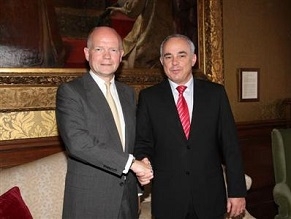|
World Jewish News

British FM William Hague told Israeli Minister for Intelligence and Strategic Affairs Yuval Steinitz “welcomed the EU’s decision on 22 July to designate Hezbollah’s military wing as a terrorist group”, at a meeting of the two miniters in London Wednesday
|
Hague tells Israel’s Steinitz Britain is ‘strongly committed to Israel’s security’ following Kerry’s peace talks agreement
26.07.2013, Israel and the World Israeli Minister for Intelligence and Strategic Affairs Yuval Steinitz met with British Foreign Secretary William Hague in London Wednesday, as he received the Jewish State’s close ally’s assurance of its commitment to Israel’s security and ongoing mutual cooperation. According to a statement by Hague’s office, the foreign leader “reiterated our warm welcome for Secretary Kerry’s announcement on 19 July that Israel and the Palestinians had reached agreement on the basis for resuming direct final status negotiations”.
He further paid tribute to Israeli Premier Benjamin Netanyahu and Palestinian Authority President Mahmoud Abbas’ leadership in agreeing to the talks after a near three-year impasse in direct negotiations, as he offered the UK’s support to help them “in their efforts to reach a lasting peace”.
The choice of former Finance Minister Steinitz to make the visit to London in the immediate aftermath of the EU foreign affairs council’s unprecedented decision to designate the military wing of Lebanese group Hezbollah a terrorist organisation in Brussels Monday, signals however the priority Israel places on the landmark move, which was heavily championed by the UK, which itself outlaws the Hezbollah’s military arm. Justice Minister Tzipi Livni will lead the as-yet unscheduled peace delegation to Washington on behalf of the Israelis in her capacity as chief Israeli negotiator, and as such would have been a more obvious choice to meet with Hague to discuss ongoing peace efforts.
Hague’s statement largely confirmed this implied emphasis to him meeting with Steinitz, as it led with him stating both ministers has “welcomed the EU’s decision on 22 July to designate Hezbollah’s military wing as a terrorist group”, little over a year on from the fatal terrorist attack on Israeli tourists in the Bulgarian town of Burgas, for which Bulgarian authorities have implicated Hezbollah responsible. The move required a consensus decision by all 28 EU member states.
Meanwhile, French Foreign Minister Laurent Fabius confirmed in a brief statement he had called both Abbas and Livni Wednesday to discuss the US-backed renewed peace initiative, during which conversations he “encouraged all parties on the basis of the agreement reached, to quickly resume talks in a climate of trust and dialogue”. France was “determined to support peace efforts and to encourage an agreement ending the conflict”, concluded the French minister, following a series of highly critical official comments on Israel’s settlement policy, which France has equated to “colonisation”.
Netanyahu for his part has given his public backing to Kerry’s efforts, which have formed the a key basis of his foreign policy since assuming office in February, telling a press conference following his meeting with Japanese FM Fumio Kishida in Jerusalem Wednesday that “we both want to see peace between Israel and the Palestinians”. “I hope that soon we will be able to see the beginning of peace talks. Our team is ready - we've always been ready,” he added unequivocally.
Netanyahu also invoked the continued Iranian nuclear threat, as he insisted that “it is crucial that we see a change in Iran's policy, not a change in style, but a change in substance”, and further called for an end to all uranium enrichment activity by the Islamist State. Iran was also firmly on the agenda in Hague’s meeting with Steinitz, where the Foreign Secretary conceded that whilst last month’s election of self-styled moderate President Hassan Rouhani presenting an opportunity for Iran to improve its relationship with the international community, “this requires concrete actions”.
EJP
|
|
